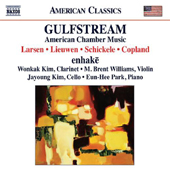
COLLECTIONS

Libby Larsen - Rodeo Queen of Heaven
Peter Lieuwen - Gulfstream
Peter Schickele - Quartet for Clarinet, Violin, Cello and Piano
Aaron Copland - Sextet for Clarinet, Piano and String Quartet
The impressive and comprehensive American Classics series of recordings from Naxos
keeps growing in leaps and bounds, and has by now pretty well covered every square mile of the American musical landscape,
but still manages to offer up world premiere recordings of works from both new and well established composers. And this new
CD is no exception.
Both the Libby Larsen Rodeo Queen of Heaven (2010) and the
Peter Lieuwen Gulfstream (2007) are making their first recorded
appearance, and certainly present themselves as solid new proponents of American music. The Larsen was commissioned
by the members of enhake, and its frenetic and nervous energy serves to emphasize this ensemble's tight and rapid-fire
delivery. The Lieuwen work on the other hand, with its flowing forward momentum underpinned by a dark and shifting
undercurrent (pun intended), brings out these musicians more expressive and emotional qualities. For me, the show-stopper
on this CD is the Quartet for Clarinet, Violin, Cello and Piano by Peter Schickele,
(the real-life alter ego of P.D.Q. Bach). It is at times melancholy, at times jazzy, dark, tongue in cheek, nostalgic and
strangely evocative. All aspects which are well defined by the fine playing of this ensemble. And it goes without saying
that the Sextet for Clarinet, Piano and String Quartet by Aaron Copland,
with the added participation of Corinne Stillwell (Violin) and Pamela Ryan (Viola),
couldn't have been better chosen to close a CD on American chamber music. A challenging work in all respects, be they
musical or technical, but nothing that this group of musicians can't handle with panache.
The common denominator within all the pieces on this new CD is the focus of attention on the clarinet. These
pieces all seem to use the clarinet as the central pivot to the musical drama, and clarinetist Wonkak Kim
slips into that role effortlessly, always leading the way where necessary, or taking on the task of being the music's main
backbone. His playing always serves the music first and foremost, and never draws undo attention to itself, a remarkable
feat when you consider his constant presence within the music's fabric. A sign of superior musicianship, no doubt.
Jean-Yves Duperron - January 2012